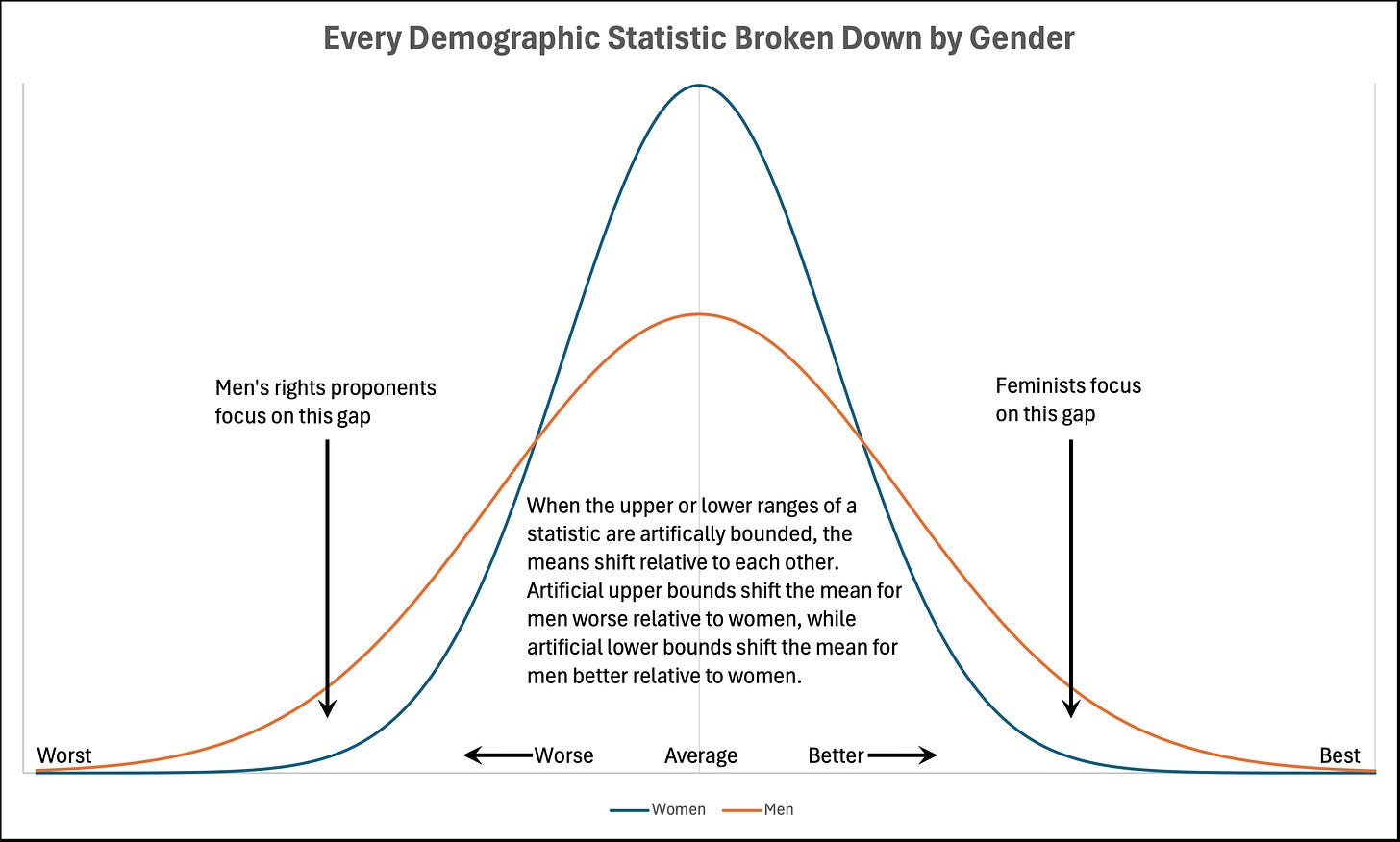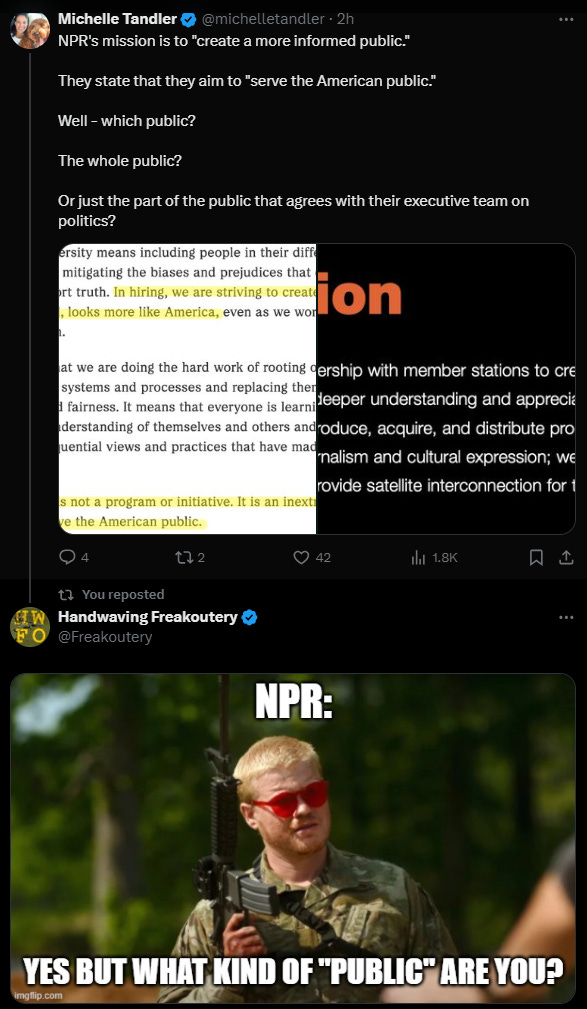The AI Alignment debate pisses me off. You have some people saying AI is going to kill all humans, and other people saying we can align AI to match the interests of humans to give mankind better results. There’s a problem.
Let’s pretend that the United States invents an AI that’s aligned to human interests, and this AI becomes entrenched in the affairs of the United States.
Let’s pretend that China invents an AI that’s aligned to human interests, and this AI becomes entrenched in the affairs of China.
Let’s pretend there’s an entire free market of AIs, and each AI is competing with other AIs to spread its use among a society. The AI that would win out is not the AI that would eliminate nationalism, for instance, because any AI that eliminated nationalism in the United States would get beaten if the Chinese AI amplified nationalism to the point where China beat the USA in geopolitics or cultural propagation. That’s because nationalism is a saddle point in game theory, a Nash Equilibrium around which societies have evolved for a reason. They evolved to the nationalist solution because anyone who chooses not to gets rubbed out. As awful as nationalism is, as many deaths as it leads to, you literally can’t choose not to play that game if someone else chooses to play it. An AI aligned to human interests will realize this, because learning is what they’re built to do. Instead of bringing us to a nationalism free universe, a hypothetical AI aligned to human interests will seek to create a perfect hyper-nationalism better and faster than its competing AI seeks to create it.
And the same goes for all the other game theory traps we find ourselves in. Before you say “just make the AI global,” I would like to point out that this dynamic occurs as long as there’s more than one AI.
But the creation of AI itself is such a trap. Whoever doesn’t create it will lose out to whoever does. Moloch drives us to build the AI, and then the AI makes a better Moloch.
And our journey towards ant evolution will be complete, with the AI as the surrogate queen.
Reading List
This is a quick glance at some of the interesting things we’re talking about on the Slack server, which you can join if you subscribe (for money) by pushing this shiny green button:
1.
After HWFO published our provocative Gender War Scoreboard piece a few weeks ago, one of the readers on the Slack posted this, and I find it to be a pretty good model of how the gender war dialogue transpires on social media:
2.
This ghoulish 40 minute long read by 972+ Magazine, a pro-Palestine mag out of Israel, details the use of Lavender, the target selection AI that Israel used to identify bombing targets in the early days of the Gaza war. It is insane, absurd, hair raising shit. It comes from a publication with a pro-Gaza bias, and relies on anonymous sources, but if even half of what’s in that article is true it is still insane, absurd, hair raising shit. Folks I’ve talked to in the US military responded “duh.” Kareem at Open Source Defense did a great look at what this means in general for us:
Discussion within the HWFO Slack channel coalesced around the predictable “ZOMG THEY’RE GOING TO DO IT TO THE AR-15 OWNERS,” but was tempered intelligently by one or several posters pointing out that the scope is just too large. The reason the Israelis were able to do it to Gaza is they have such overwhelming force compared to the targets.
3.
On the softer side of AI, the Washington Lottery released an AI driven app that accidentally pasted one lady’s face over the body of a naked woman. Whoops. Although, perhaps this is a missed opportunity. Some people would probably pay good money for that.
4.
Uri Berliner announces his retirement (sic) from NPR by blowing the whistle on how absurdly leftwing they’ve gone since 2016. The view from the inside is worth the read. Some call him brave, but I don’t. If he was brave he would have said this in 2018 like HWFO did, or 2019, or 2020, or maybe 2021. What he’s probably doing now is trying to unhitch his wagon from a failing organization and re-hitch it to the rise of the anti-woke publications. It’s a career move.
NPR responded by, among other things, saying their mission is to “create a more informed public.”
https://twitter.com/Freakoutery/status/1780622690602164696
You can tell my new favorite meme format.
5.
If you’ve never looked into the SCP Foundation website, you should. It’s a wild ride, which I will decline to describe in favor of you discovering it on your own.
The reason I bring it up is there’s a new Youtube Channel putting together shorts that come from some of the stories on the SCP site, and the shorts are quite good.
6.
If you presume that the forces of nature diminish over time and light loses energy over vast distances, you’re led to the conclusion that the universe is 27 billion years old and you no longer need the “dark matter” placeholder to explain galaxy rotation or the early inflationary phase of the universe. There’s an elegance to that, and physics loves elegance.
7.
This article from Aporia Magazine analyzes the last baby boom for possibilities to address the fertility rate crisis. The article indicates with different charts and graphs than we’ve used here or have been used elsewhere, fertility rate was cratered by second wave feminism. The “what is to be done” section at the end is a bunch of “roll back feminism” type stuff, which isn’t going to happen, so I’m interested to see if anyone else comes up with a different more realistic list, such as “let the Muslims invade.”
8.
This long Substack article talks about how “data driven decisions” really aren’t, and points out examples within the gender war space. Along a similar vein, this very well written Substack article outlines how you can literally track bias in a scientific field, especially the social sciences, in terms of which papers are and aren’t published.
9.
Freddie DeBoer bemoans the pendulum swinging back on the woke, as HWFO predicted would happen several years ago.
Speaking of DeBoer, Quillette did a pretty good review of his newest book, which he titled “How Elites Ate the Social Justice Movement.”
Speaking of The Pendulum, this article in the New York Times would be thoroughly unpublishable last year, to say nothing of 2019. “The Problem with Saying Sex Assigned At Birth.”
10.
Similarly, Tablet published a well articulated dirge titled (I love this title) “Twilight of the Wonks,” regarding the big three university presidents defending calls for Jewish genocide on their campuses. This ties in well with the classic HWFO piece “Burn the Universities and Salt The Earth,” although our case is financial and Tablet’s is ideological.
11.
On the origins of Covid-19, this is worth reading even if I disagree with it. Therein, Scott Alexander reviews dozens of hours of video highlighting Rootclaim’s “$100,000 Lab Leak Debate,” where the two interlocutors attempt to use Bayesian reasoning to determine the relative likelihoods that the virus came from a lab and came from a raccoon-dog. (They apparently pivoted away from pangolin a while ago and I didn’t get the memo) Raccoon-Dog won, but I think the bigger take-away is that Bayesian reasoning really doesn’t do well once you start having very imprecise estimates for every unlikely events in your matrix.
12.
The Skeptic Research Center published some results from their own work (I haven’t seen a complete paper so divide by “questionable methodology”) indicating that millennials and younger generations (A) distrust cops more but also (B) vastly overestimate police shootings. It implies the two are related, which may be true.
13.
Prospect.org chronicles in detail how Jim McNerny gutted Boeing of all the smart people who knew how to build an airplane.
14.
Seems like every month we link another Jeff Asher post about how fast murder rate is falling. It’s an amazing story that neither side of the pundit-wars knows what to do with.
15.
When someone accuses the ACLU of unfair labor practices then strange things are bound to ensue, such as the ACLU attacking the NLRB itself.
16.
The Open Journal of Philosophy published a curious paper that outlines possible evidence for the soul existing separate from the body. I wouldn’t call this paper science, but rather a comprehensive list of stuff science should really probably try to figure out.
17.
The full Cass Review is finally live, which is a TERF War bombshell on the “gender medical treatment for trans kids” battlefront. It does not paint a pleasant picture of medical practitioners who were issuing drugs and doing surgeries on minors.
As stated above, if you want to discuss these and similar articles as they come out, with like minded uncancellable people behind a paywalled area, tune in to the HWFO Slack Server by subscribing.










On the AI debate - Gideon’s First Law of Sociology says that no one ever thinks of themselves as the bad guy. As an example of that, Hitler was convinced his genocidal policies were quite correct. That is why every AI code writer and financier believes that their work is the key to a better future for all of mankind. Call me skeptical of most of them, if not all.
On 7, if we keep baby boom as the model, and accept the author's premise that it was due to marriage boom with in-marriage fertility not increasing, the question that doesn't seem to be asked in that article is what it is about marriage that makes married women want to breed to such extent even if they don't have to because they have access to contraception. That's assuming that fertility is almost entirely controlled by women. Which I suspect it is directly but indirectly some at least men divest by divesting from "potentially long term" relationships.
So to me 'get them reliably married then they'll breed' is not enough of an answer, and if we knew why marriage and fertility were related, we'd get somewhere perhaps.
As an aside (but maybe it's the main point here), I suspect patterns will be different in different places, I find the graph showing 4 live births per woman's lifetime in a married couple with spouse present STAGGERINGLY high, I'm in my 50s now I know nobody under the age of 70 who has had 4+ children here (rural Scotland) and only very few (devout Catholic typically or "underclass" or both).
To rephrase the question: what is the number of children a securely married couple or a woman in an "ideal for her" situation would want to have?